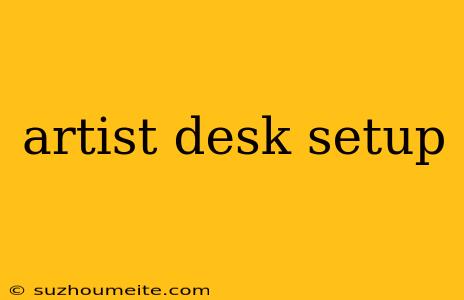Setting Up the Perfect Artist's Desk: A Guide to Creativity and Comfort
A well-organized and inspiring workspace is essential for any artist, whether you're a painter, sculptor, writer, or musician. Your desk is your creative hub, where ideas are born and masterpieces are crafted.
This guide will explore the key elements of a perfect artist's desk setup, focusing on functionality, comfort, and inspiration.
Essential Components
1. A Spacious and Adjustable Desk:
- Size: Opt for a desk that's large enough to accommodate all your supplies and tools comfortably. You may need extra space for larger canvases, sculptures, or musical instruments.
- Adjustability: A height-adjustable desk can help improve posture and comfort, allowing you to work in a position that suits your body.
- Material: Choose a durable material like wood, metal, or laminate that can withstand the wear and tear of creative projects.
2. Ergonomic Chair:
- Support: A comfortable and supportive chair is crucial for long hours of work. Look for a chair with adjustable height, lumbar support, and armrests.
- Comfort: Choose a chair with breathable fabric and a cushioned seat to avoid discomfort.
3. Adequate Lighting:
- Natural Light: Maximize natural light by placing your desk near a window.
- Artificial Light: Invest in a high-quality desk lamp that provides bright, even illumination without glare. Consider using LED bulbs for energy efficiency and longevity.
4. Storage Solutions:
- Drawers: Use drawers to organize your supplies neatly and keep your workspace clean.
- Shelves: Shelves are great for storing larger items like canvases, art books, or musical instruments.
- Storage Bins: Use storage bins for smaller items like brushes, pencils, and paints.
5. Creative Inspiration:
- Inspiration Board: Create a dedicated inspiration board where you can pin up images, quotes, and sketches that spark your creativity.
- Personal Touches: Add personal touches to your workspace with plants, artwork, or photos that inspire you.
Essential Tools for Different Artists
For Painters:
- Easels: Choose an easel that is stable and adjustable for different canvas sizes.
- Palettes: Invest in a durable palette that is easy to clean and offers enough space for mixing colors.
- Brushes: Have a variety of brush sizes and shapes to suit different painting styles.
For Sculptors:
- Work Table: A sturdy work table with ample surface area is essential for sculpting projects.
- Tools: Acquire a comprehensive set of sculpting tools, including chisels, rasps, and modeling tools.
- Clay: Choose a clay that is suitable for your sculpting style and technique.
For Writers:
- Laptop or Desktop Computer: A reliable computer with comfortable keyboard and large screen is essential for writing.
- Printer: A printer can be useful for printing drafts and sharing your work.
- Notebooks and Pens: Keep notebooks and pens close by for jotting down ideas and brainstorming.
For Musicians:
- Instruments: Choose a comfortable and high-quality instrument that inspires you to create.
- Amplifier and Speakers: Invest in an amplifier and speakers that provide clear and powerful sound.
- Music Stand: A music stand will help you keep your sheet music organized and within reach.
Tips for a Productive Workspace
- Declutter Regularly: Clear your desk of unnecessary items to create a focused and inspiring environment.
- Clean Regularly: Keep your workspace clean and organized for a more enjoyable creative process.
- Take Breaks: Step away from your desk periodically to rest your eyes and recharge your creative energy.
- Experiment with Different Settings: Try working in different environments to find what inspires you the most.
- Don't Be Afraid to Personalize: Make your workspace uniquely your own with personal touches and decorations that inspire you.
By following these tips and considering the essential components for different art forms, you can create a perfect artist's desk setup that fosters creativity, productivity, and comfort.
